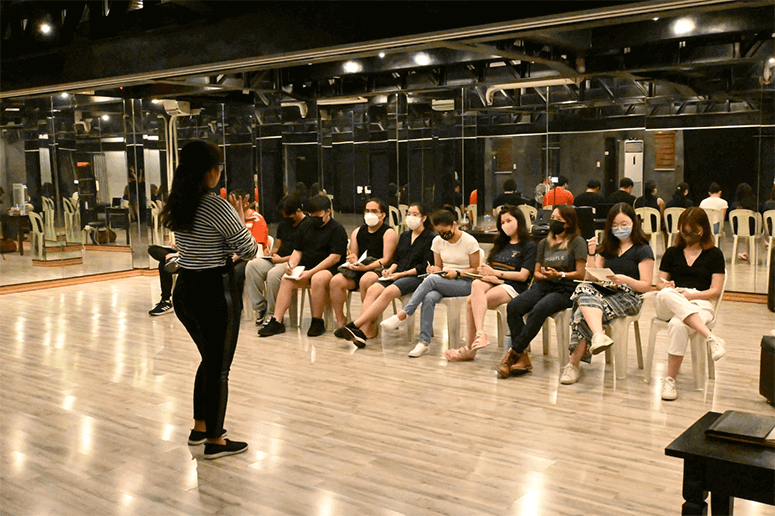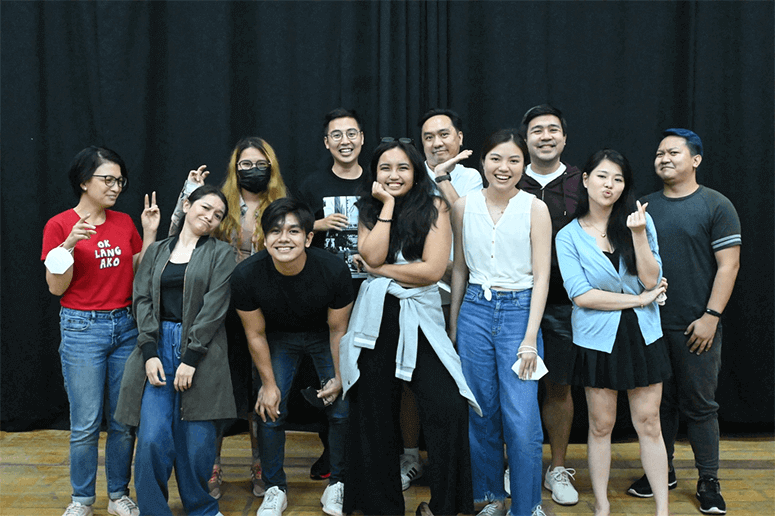Alecx Lorica is changing the acting scene
At the center of the room are two chairs facing each other.
Around it sits a small group of people in a half-circle — some celebrities, some newcomers. In front, Alecx Lorica, clad in an all-black ensemble, introduces a safe word — “button” — before she asks two people to participate in what is called the repetition exercise. Despite the initial awkwardness, Lorica’s warmth and command of the room quickly dissolve any animosity and discomfort. Before long, the room of strangers begins.
At 25, Lorica is younger than most of her students — some of whom have been in the industry longer than she’s been alive; some of whom live outside of the Philippines. But in the span of two years, she has made a name for herself by becoming one of only two Designated Meisner Teachers in the country and creating her own acting studio — Sightlines Actors’ Studio.
Young STAR sat down with Alecx to talk to her about her beginnings as an acting coach, creating an actors’ gym, and why self-agency is key to being an artist.
YOUNG STAR: What was your life before you were an acting coach?
ALECX LORICA: For as long as I can remember, I wanted to be an actor. But my perceptions of acting were still more performative. The motivation was self-expression and, let’s be real, for a lot of actors, they start because they like the attention and they like being onstage and being the star.
In college, I formed my reason for wanting to act that was less rooted in myself and more for others. During that time, I also discovered my love for teaching when I was an assistant director for plays. With acting, it’s when I feel most alive, most connected, and most human. It’s when I get to fully express myself, it’s such an exhilarating experience. However, teaching is what gives me fulfillment.
After that, I spent some time doing some corporate work to figure out my life and figure out a way to do the things I wanted to do. The original plan was to take a master’s and if I have my MFA, I could be an acting teacher. But then the pandemic happened and I was kind of getting impatient (and thought) maybe there’s something I can do to make this dream of mine happen sooner.

When did things start becoming a reality?
I sought a teaching certification in the Meisner technique specifically. Then, once I was taking the class (under Meisner Institute executive director Scott Trost), that’s when it started becoming a reality. I started training in February 2021, finished two of the modules in June, and started holding trial classes around July. Just the fundamentals to test out the curriculum. I didn’t expect to be a full-time acting coach this early in my 20s. But I’m here and I can honestly say that it’s my full-time job.
As someone who advocates for safe spaces in the arts, I hope that we unionize. When it comes to the creative process, I hope that people become more collaborative and connect more.
What was that first class like?
I was away from the industry for a while and there was a fear: Kaya ko pa ba? (But) my classmates and Scott were so welcoming. I don’t think I’ve ever felt that before.

Even if the impostor syndrome was kicking in, I just felt so accepted. My classmates were professors from universities, and acting teachers in high schools in the US, their qualifications were wild. But from the get-go, I felt listened to and valued, despite my age and lack of credentials in comparison to them, and that just really encouraged me to keep going and it has definitely affected my view of myself, my work, and my craft.
Can you talk about the Meisner technique?
The Meisner technique still stems from the early teachings of (Russian theater pioneer Constantin) Stanislavski but focuses on behavior and doubles down on the importance of the other person. If I were to compare it to the other acting techniques that I’ve been exposed to, what the Meisner technique really addresses is eliminating self-consciousness and overthinking and working on the fundamentals.
If you introduce acting with a script immediately, actors will start playing with ideas, performing, and having these preconceived notions. Meisner breaks it down to the core of yourself first, and you add elements as you progress.

Do you think that acting is for everyone?
Absolutely. No hesitation. It’s an exploration of your own humanity and you become more empathetic toward other people. If other people had that space, the world would be a better place because people would be more understanding and we’d feel more connected.
Was that one of the reasons you opened up your own acting studio?
I wanted a space for actors to play, collaborate, and work on their craft, which I think is lacking here. Where everyone is equal regardless of acting experience. Working on your craft constantly is what it means to be a working actor. I wanted an actor’s gym because acting is a muscle. You can’t just prepare when the audition is there.
Actors are athletes and what we’re training is not just our voices or bodies. We’re training our imagination, we’re training our hearts to be open, to the emotional investment required of us. It came from a frustration of not having that space for myself and being able to provide that space for myself and for others to form a community.

What’s your dream for your students?
My goal is that they outgrow me and seek out other teachers. Just because I teach Meisner, that doesn’t mean I don’t advocate for other techniques. No. I myself mix acting techniques and I want my students to have that self-agency to go for it and seek out what they want to learn for themselves.
What are your hopes for the industry?
As someone who advocates for safe spaces in the arts, I hope that we unionize. When it comes to the creative process, I hope that people become more collaborative and connect more. I hope that training is given more value and we step away from being result-oriented and really see the importance of rehearsal. Not just for theater but also for film.
What’s the best advice you can give to an aspiring (or even a veteran) actor?
Keep learning. Stay humble. Do the work. Prepare. The testament to being a working actor is the work you do off-screen or off-stage. The things that you do on your own without other people having to tell you what to do.
And to explore, discover, and play. To not worry about the results and the accolades. Acting for yourself and acting for millions of people shouldn’t feel different. If you love your craft, you do it just because.


